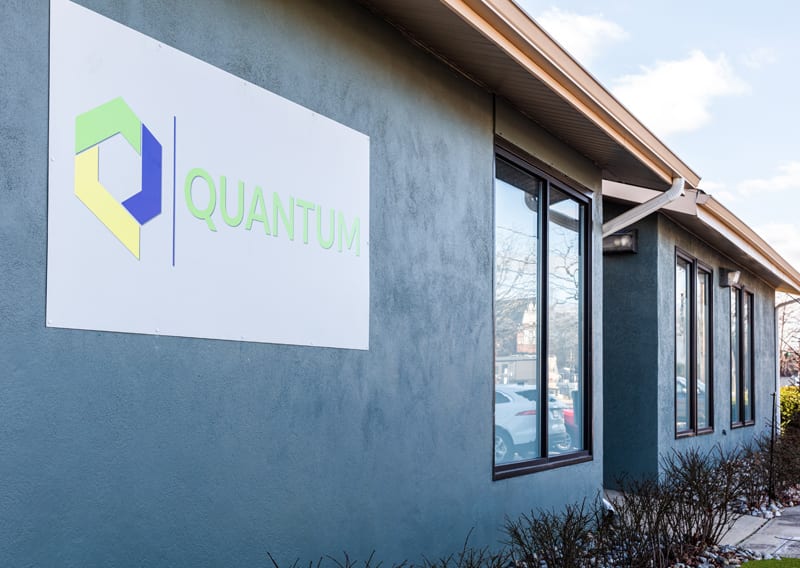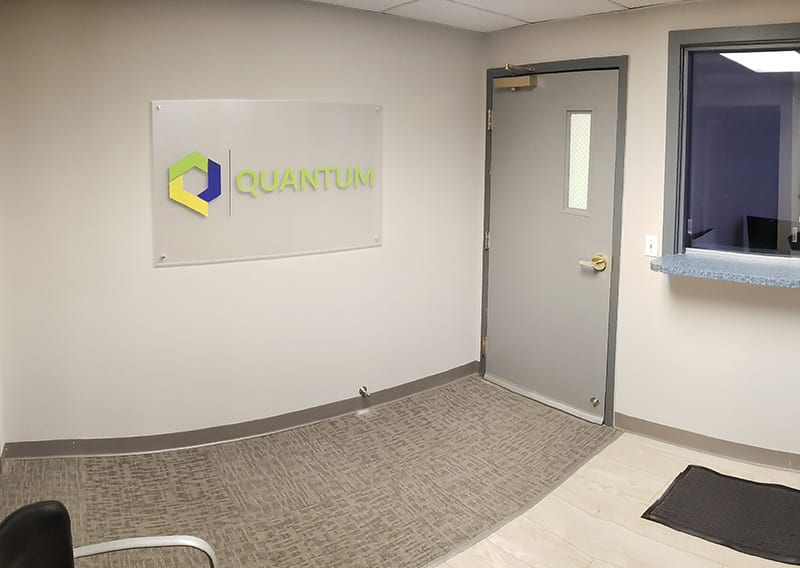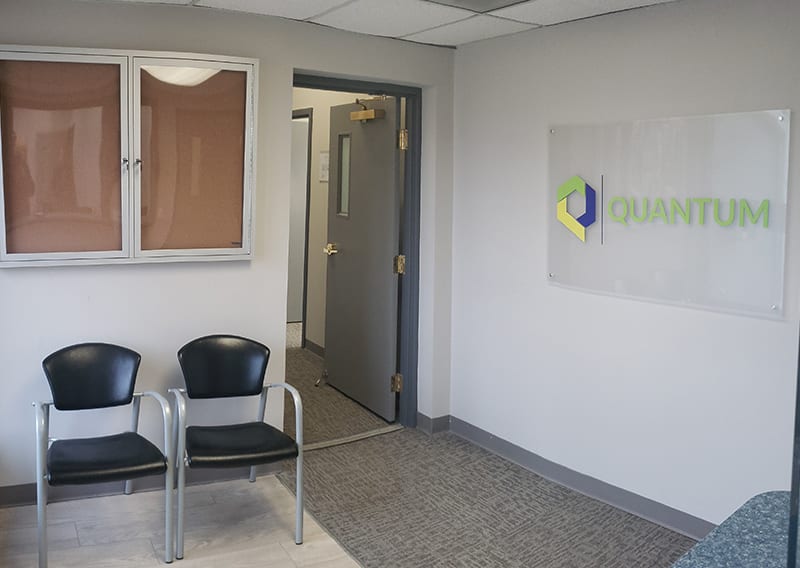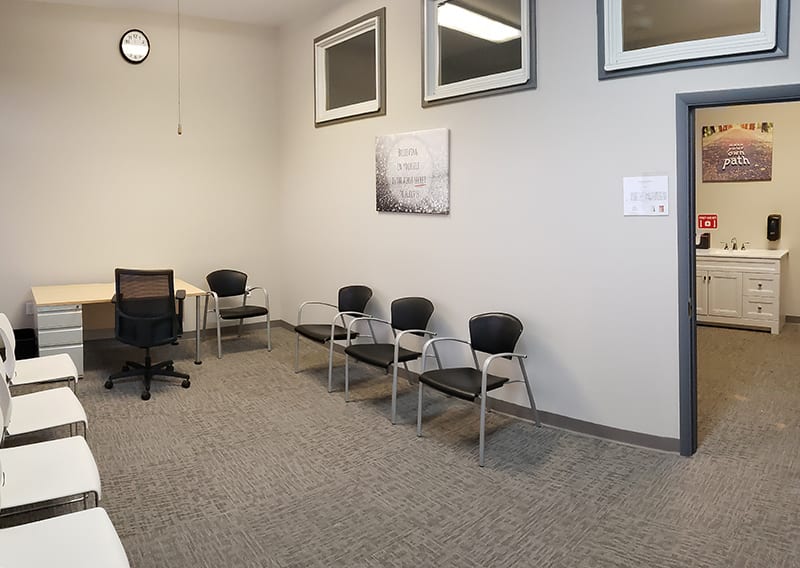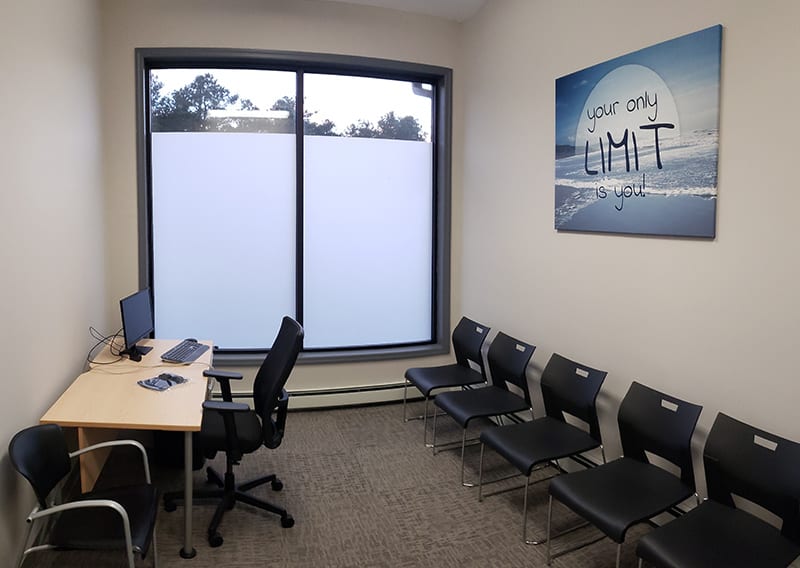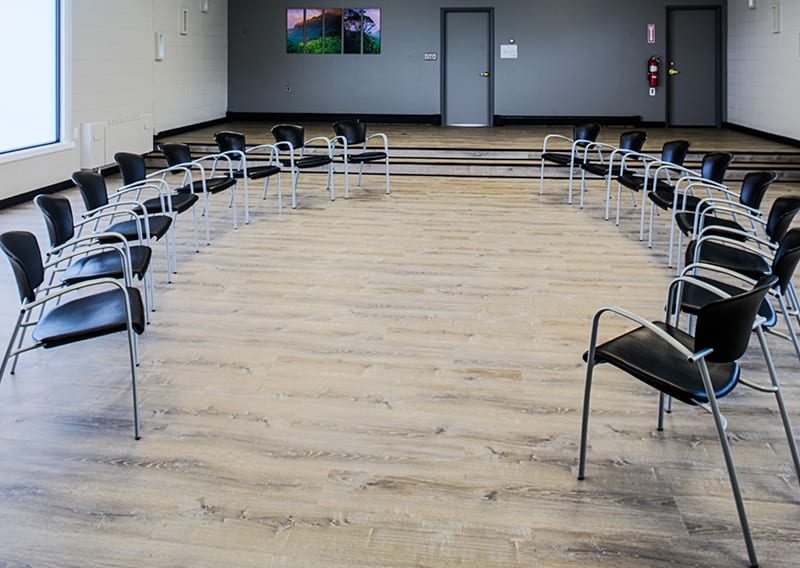Our facility is a warm, inviting, cozy, and secure environment that provides the perfect level of safety, comfort, and privacy as you receive treatment and get on your path to wellness. We’ve designed our space to allow for a low-stress environment where you can focus on your well-being.
Given the concerns of the COVID pandemic, we’re ensuring procedures are followed to create a clean environment for our patients, staff, and visitors. We’ve gone above and beyond CDC and New Jersey State guidance to design our cleaning and disinfecting protocol so that there is no question of the cleanliness and safety of our facility.
You’re here to get well and our priority is maintaining a safe, clean, peaceful, and welcoming environment for you to do just that.
To see our response to Covid-19, click here.
Photo Gallery
Click photos to enlarge
Are You Ready to Begin Your Journey to Recovery?
You could be completely covered. Verify Your Insurance Today.
The Quantum
Process Outpatient Rehab NJ
1. Make the Call
Contact our Quantum Team at
(609) 993 – 0733 to get started.
2. Complete
Your Intake
This streamlined process includes a series of questions and discussion of your unique needs and goals.
3. Get the Best Care Team Possible
After your intake, you’ll meet your Care Team, a group of amazing professionals dedicated to helping you make recovery reality.
4. On-Going Support
After you meet your Care Team, you’ll start to receive treatment based on a Care Plan that’s designed to help you achieve and sustain your recovery.
- Why Choose Quantum Behavioral Health
- Highest Rated Alcohol Detox Program
- Drug Detox Program
- Top Alcohol Rehab in Princeton
- Drug Rehab in Princeton
- How Much Does Rehab Cost in Princeton?
- How Long Is Detox?
- How Long Is Rehab?
- 30 Day (Short-Term Rehab)
- Long Term Rehab (60-90 Days)
- Additional Therapies & Addiction Treatments Available:
- Does My Insurance Have Coverage For Rehab?
- MAT
- Cognitive Behavioral Therapy (CBT)
- Dialectical Behavioral Therapy (DBT)
- Rational Emotive Behavioral Therapy (REBT)
- Dual Diagnosis Treatment
- EMDR
- Relapse Prevention
- Life Skills Training
- Vocational Training
- Group Therapy
- Experiential Therapy
- One on One Therapy
- Family Therapy
- Trauma Informed Therapy (After PTSD)
- Physical Fitness
- Off Site Activities
- Holistic Addiction Treatment in Princeton
- Anxiety Disorder
- Bipolar Disorder
- Borderline Personality Disorder (BPD)
- Codependency
- Depression
- Impulse Control Disorder
- Post-Traumatic Stress Disorder
- Alcohol u0026 Drug Rehab for Active Military Members & Veterans
- Stresses Of Military Life for Active Service & Family Members
- Specialized Addiction Treatment for Military Service Members & Veterans
- PTSD
- Mental Health Services for Military Members & Veterans
- Why Choose Quantum Behavioral Health for Detox & Rehab in Princeton
Why Choose Quantum Behavioral Health
Clients often prefer Quantum because of our focus on individually tailored treatment plans and outpatient programs. Residential treatment isn’t right for everyone. Our clients can get the support they need but retain the freedom to work, attend school, or care for their families after their treatment for the day is complete. Our therapists provide empathetic care in our safe, positive treatment setting. With our help, you can put your addiction behind you and lead a more healthful and rewarding life.
Highest Rated Alcohol Detox Program
Medical detox is the process by which the body gets rid of toxins. In this case, the toxin is alcohol. In order for a person to begin to recover from their alcohol addiction, they must overcome their physical dependence on it. Medical detox addresses this stage of recovery. Quantum doesn’t offer medical detox, but some of our network rehab partners do. After completing the detox process, you can enter a rehab program at Quantum. We feature various outpatient programs that offer different levels of support. Rehab treatments target the psychological and behavioral aspects of substance use disorders.
Drug Detox Program
Drug detox is frequently an important first step in the addiction recovery process. However, if you’ve already been through detox at a hospital or another rehab center, you can begin partial hospitalization treatment or intensive outpatient treatment at Quantum. We do not specialize in detox programs, but many of our network partner treatment centers do. We can refer you to a partnering rehab if you require residential medical detox. Clinically supervised detox may be necessary for you to overcome the physical dependence on drugs or alcohol. After completing detox, you can then begin your Quantum recovery program.
Top Alcohol Rehab in Princeton
Alcoholism affects millions of people all across the country. If you’re suffering from alcohol addiction, rehab treatment programs can help you overcome your dependence and maintain sobriety. Quantum features different levels of care with our various outpatient rehab programs. We offer many types of addiction treatments, including conventional addiction therapies like dialectical behavior therapy and alternative and holistic treatments such as yoga. Additionally, we feature family therapy for clients who wish to participate. By attending individual treatment sessions and group treatment sessions, clients can get the support they need to achieve their sobriety goals.
Drug Rehab in Princeton
An addiction to prescription drugs or illicit drugs is serious and, as statistics show, can be life threatening or even deadly. Substance addiction will lead to the deterioration of mental and physical health; no user knows exactly when or at what point the damage done to their bodies will be permanent. The sooner drug addiction is managed with abstinence, the better. Drug rehab at Quantum targets the mental and behavioral aspects of drug addiction. If you’re addicted to opioids, cocaine, or some other drug, you can develop the strategies needed to stay away from these substances and protect your recovery.
How Much Does Rehab Cost in Princeton?
The cost of rehab varies depending on the level of support that clients need. Quantum features partial hospitalization programs, intensive outpatient treatment, and outpatient therapy as well as dual diagnosis treatment. Many clients have insurance plans that provide coverage for rehab treatment as well as mental healthcare. Ideally, clients should contact Quantum to discuss their individual insurance plans and treatment needs.
How Long Is Detox?
If you enroll in a medical detox program, you can expect it to last between 5-10 days. In some cases, an individual may need less time in detox but others may need more time. A person’s own unique chemistry impacts the amount of time it takes the body to rid itself of drug or alcohol toxins. The substance in question, whether an opioid, alcohol, or other substance, also impacts the time frame. A person addicted for a long period of time may need more time in drug or alcohol detox to overcome their physical dependence.
How Long Is Rehab?
The addiction recovery process is different for everyone. Like any physical or mental health condition, the recovery process is unique. You may find that you become stable quickly; in such cases, a 30 day treatment program may suffice for your treatment needs. On the other hand, Quantum offers flexible programming. You may find it advantageous to transition from a 30 day partial hospitalization program to an outpatient rehab program. If you have a dual diagnosis, spending more time in rehab can be helpful. The idea is to get the support you need. Recovery can be a slow process, but with support, you don’t have to journey alone.
30 Day (Short-Term Rehab)
Many addiction recovery programs are based on a 30-day treatment model. Generally, 30 days is the minimum time needed to build a strong recovery foundation. The reality is that recovery can take many months–even longer. For some people, 30 days isn’t enough time to learn how to manage their triggers and guard against relapse. Many clients choose to transition from highly intensive programs to less intensive programs. Upon completing rehab programs, it’s ideal to attend aftercare programming designed to support the long-term recovery process.
Long Term Rehab (60-90 Days)
For some clients, 30 days isn’t enough time to recover. That’s why many rehab centers like Quantum Behavioral Health offer longer term treatment programs. Spending a few months in therapy is often the best choice for someone recovering from drug or alcohol addiction. Studies have concluded that the longer someone remains in therapy for substance abuse treatment, the less likely they will be to relapse. At Quantum, clients can get the flexible support they need to manage their condition effectively.
Additional Therapies & Addiction Treatments Available:
Quantum Behavioral Health features outpatient rehab programs, including partial hospitalization treatment, intensive outpatient treatment, and outpatient programs. Each of these programs not only includes evidence based rehab treatments, but also alternative treatments and holistic therapies. Each of these therapies can support lasting recovery. Alternative treatments like art therapy, yoga, and acupuncture can address different aspects of the recovery process. It’s not surprising that some clients find some therapies more advantageous than others. This makes recovery more flexible and a better fit for their treatment needs.
Does My Insurance Have Coverage For Rehab?
The Affordable Care Act provided legislation that requires medical insurance providers to cover mental health treatment and substance abuse treatment. Providers must provide a minimum level of coverage outlined by the ACA. Some insurance carriers go far beyond the minimum. When you contact Quantum Behavioral Health, we can help you determine what your provider will cover and how much coverage your plan entitles you to. Whether you have Blue Cross Blue Shield, United Healthcare, or some other medical insurance, you should have some level of coverage for the treatment you need.
MAT
Medication assisted treatment MAT has become an important addiction treatment for some people. MAT is especially effective for opioid use disorders like heroin addiction as well as for alcohol addiction. Clinicians can prescribe medications that greatly reduce the cravings a person might experience to use the drug. Cravings can cause relapse. Medications can also reduce withdrawal symptoms or trigger them in those cases that a person does relapse. If MAT is right for your condition, it can be included in your addiction treatment plan.
Cognitive Behavioral Therapy (CBT)
Cognitive behavioral therapy is a core treatment at Quantum as well as other clinically driven treatment programs around the country. During cognitive behavioral therapy sessions, therapists will help clients reflect on their triggers, to identify them so that they can develop strategies to manage them. Therapists help clients to find the connections between their behaviors, thoughts, and emotions. Understanding the connections is the first step to managing them more effectively so that relapse can be prevented.
Dialectical Behavioral Therapy (DBT)
Dialectical behavioral therapy is another medically sanctioned addiction treatment. During DBT, therapists focus on strategies that clients can use to tolerate emotional distress better. Distress tolerance is important because, as clients know, life can become emotionally difficult. Finding ways to cope with distress in healthy ways is part of a relapse prevention strategy. Managing difficult emotions is crucial for maintaining sobriety as these emotions often pave the way to relapse.
Rational Emotive Behavioral Therapy (REBT)
During rational emotive behavioral therapy, a therapist works with clients to help them confront their unhealthy thoughts. A person’s thoughts can trigger alcohol or drug abuse as well as other unhealthy behaviors. When people have irrational beliefs and thoughts, it can lead them to behave in negative ways. Feeling excessively guilty or bad about a mistake or feeling that life has to be ‘perfect’ in order to be happy are problematic when they lead to unhealthy behaviors. Therapists help clients reframe their thoughts so that they can arrive at more realistic perspectives about triggering issues.
Dual Diagnosis Treatment
Roughly a third of individuals with a substance abuse problem also have a dual diagnosis. This means that they have a mental health condition in addition to their drug or alcohol addiction. The best way to treat dual diagnosis is simultaneously. Our rehab center can provide treatment for cooccurring disorders. If you’re suffering from post traumatic stress disorder, depression, or another mental illness, we can help you manage it along with your addiction. In many cases, both therapy and medication management can help.
EMDR
Eye movement desensitization and reprocessing is used to treat patients who are struggling with past trauma. Unlike traditional talk therapies, EMDR works to change where memories are stored in the brain. The change in location is thought to be helpful to individuals as they work to cope with these memories better. A person who has post traumatic stress disorder may respond well to EMDR treatment, which can enhance their other forms of therapy such as trauma-informed therapy. Coping with trauma in healthy ways is part of a good relapse prevention strategy.
Relapse Prevention
The addiction recovery process can be challenging and fraught with ups and downs. Some clients may be more vulnerable to relapse. Relapse prevention is a form of therapy that focuses on the strategies for preventing relapse from occurring. Therapists help clients to form strategies that will help them to successfully manage their triggers to abuse drugs and alcohol. Clients also spend time learning to identify the stages of relapse. By becoming more proficient in the identification of these stages, they can better manage them.
Life Skills Training
Years of alcohol and drug abuse can take a toll on many aspects of a person’s life. Life skills training can help them develop skills that promote healthy living. Engaging in healthful ways of living supports recovery and can help a person prevent relapse. Improving time management and communication skills, for example, can be helpful as a person rebuilds their life in the context of sobriety. Quantum features many alternative and holistic skills such as life skills training that can support long-term recovery.
Vocational Training
After completing their rehab program, many clients will return to their lives and to work. However, if they don’t have a job or want to change their job, they may be in need of some vocational training. A person who has been away from the work world for a while may feel out of step. At Quantum, we want to make it easier for them to find a job and perform well. Work can form a major part of a person’s healthy daily routine. With vocational training, clients can learn important skills related to a wide range of jobs and careers.
Group Therapy
Group therapy is a treatment cornerstone at addiction treatment centers all over the country. The group format provides a supportive environment for clients where they can learn together about how to manage substance use disorders. Clients participate in therapist-led discussions and are able to share their own insights and feelings about drug and alcohol abuse as well as the recovery process. Group therapy is used for many different treatment modalities.
Experiential Therapy
Experiential therapy provides clients with an alternative to traditional in-office treatments. It gives clients the opportunity to immerse themselves in a new setting with alternative treatment modalities. The setting might be in a music or art studio. It might involve outdoor activities like hiking. It could involve animal interactions as in the case with equine therapy. Not all clients are comfortable with traditional talk therapy or sometimes they simply need a break from the therapeutic process. Experiential therapy provides a terrific therapeutic balance with other treatments.
One on One Therapy
Not all addiction treatment centers prioritize one-on-one therapy, but at Quantum, we do. However, different clients have different treatment needs. Some clients need more one-on-one time with a therapist than others. For instance, a client with a dual diagnosis may need more direct support from a clinician. During individual therapy, clients and their therapist work together through the issues that are specifically relevant to their addiction recovery process. Individual therapy is also featured with multiple treatment modalities.
Family Therapy
If you have an addiction to alcohol, prescription drugs, or illicit drugs, it can take a toll on your life as well as your family. Our clients’ loved ones experience suffering too. That’s why family therapy is an important part of the recovery process for many clients and their families. During family therapy, a trained therapist helps family members understand addiction from a clinical perspective. The therapist helps each of the members communicate more effectively with one another and to learn the proper ways to support their loved one during their recovery. Most families in therapy can benefit from support as they try to heal from the pain addiction brought to their lives.
Trauma Informed Therapy (After PTSD)
In a basic sense, trauma-informed therapy takes a person’s past traumatic experiences and emotional distress into account when providing treatment for substance addiction or dual diagnosis. Past trauma and the emotional distress it causes are frequently triggers for abusing alcohol and drugs. This type of therapy can be helpful for many clients, but especially those recovering from post traumatic stress disorder.
Physical Fitness
Physical fitness has become a popular holistic offering at many addiction rehab centers today. Fitness, of course, supports physical health, but there is substantial scientific evidence to suggest it enhances mental health too. When a person exercises, their body releases endorphins that not only support the healing of muscles and tissues from the exertions, but also the mind. Physical fitness can be naturally therapeutic. Running or even walking can help reduce feelings of stress or emotional distress. Many clients incorporate fitness into their long-term plans for managing their triggers to drink or use drugs.
Off Site Activities
Traditional in-rehab therapies like cognitive behavioral therapy are ideal for treating alcohol or drug addiction, but sometimes it’s helpful to break up the treatment routine with off-site activities. These activities can be a great way for clients to de-stress and enjoy spending time with other clients in recovery. Off-site activities can be therapeutic, providing clients with sober-friendly ways to spend time. These activities might include seeing a play, hiking, or time at the beach. Like other alternative therapies, off-site activities can enhance the recovery process.
Holistic Addiction Treatment in Princeton
Medically sanctioned addiction treatments have the support of the scientific community because they’ve been studied, and the studies demonstrate their efficacy. However, alternative and holistic treatments show great promise in the treatment of alcoholism and drug addiction; they haven’t been studied as rigorously but there is strong anecdotal evidence that they support recovery. Our holistic offerings complement our clinically driven treatment programs. Together, all of our addiction treatments support different aspects of the recovery process. Therapies like acupuncture, sound therapy, reiki, and yoga provide clients with benefits like stress relief and the practice of mindfulness. It’s common for clients to continue many forms of holistic therapy like yoga like after they complete rehab as a form of recovery maintenance.
Anxiety Disorder
A person with anxiety disorder finds it difficult to stop worrying. Their worrying can be so intense that it can become quite debilitating. Worries can also be disproportionate to the reality of the person’s situation. Sometimes anxiety disorder is accompanied by panic attacks or depression. Fortunately, therapy and medications can help someone manage their anxiety disorder. Antidepressants like SSRIs can be very helpful in the treatment of anxiety and are not addictive like certain anxiety medications like Xanax. A person who has anxiety and a substance use disorder can benefit from simultaneous treatments that address both conditions.
Bipolar Disorder
A person with bipolar disorder often experiences mood extremes that can last for weeks or months. A person may feel extreme depression. Months later, they may enter the manic phase of their condition. While the depression phase can include feelings of hopelessness and isolation, the manic phase is characterized by sociability, increased energy, and exaggerated feelings of wellness. There are medications that can alleviate symptoms of this disorder. Therapy and treatment for chemical dependency can help clients manage both of their conditions successfully.
Borderline Personality Disorder (BPD)
Someone with a borderline personality disorder is often susceptible to compulsive behaviors like drinking or drug use. They often experience mood swings and struggle with relationships. People with borderline personality disorder find it difficult to control their outbursts. They may also experience emotions that are disproportionate to circumstances. Having a borderline personality disorder can be challenging, especially when it’s coupled with substance abuse problems. At Quantum, we treat many mental health conditions as part of our dual diagnosis treatment plans. We can help.
Codependency
Codependency is characterized by certain unhealthy relationship traits. In a codependent relationship, one person is disproportionately needy while the other individual feels a powerful urge to be needed. Codependency is often found in relationships where one individual is suffering with a drug or alcohol addiction and the spouse or parent ‘enables’ their unhealthy behaviors. For instance, minimizing their spouse’s alcohol abuse or giving money to someone who will spend it on drugs are enabling behaviors. Therapists work with clients in codependent relationships to help them identify dysfunctional thoughts and behaviors so they can, ultimately, stop them.
Depression
Depression affects millions of individuals. When someone’s depression becomes severe, it can be debilitating. People who experience depression often have symptoms such as hopelessness, fatigue, sadness, loss of interest, irritability, and even suicidal thoughts. Quantum can provide dual diagnosis treatment for depression along with substance abuse treatment. Many people with depression respond well to medication management and therapy. Often, depression can be made worse by a drinking or drug abuse problem. Once a person stops abusing drugs and alcohol and gets treatment for their mental illness, they can begin to effectively manage both their cooccurring disorders.
Impulse Control Disorder
Having an impulse disorder means that the individual struggles to control their behaviors. Someone who can’t stop themselves from stealing or setting fires is said to have an impulse control disorder. When this condition is coupled with drug or alcohol abuse, it can cause immense chaos in the individual’s life. The compulsions associated with both conditions can be managed, however, with high-quality mental health treatment and substance abuse treatment.
Post-Traumatic Stress Disorder
Post traumatic stress disorder is a serious mental health condition. A person may develop this disorder after experiencing or witnessing traumatic events. The disorder is characterized by symptoms such as flashbacks, anxiety, depression, insomnia, and even panic attacks. At Quantum, people with this condition can get dual diagnosis treatment. Some people with PTSD may turn to drugs or alcohol to soothe their anguish. However, this type of self-medication can lead to addiction. At Quantum, we can provide treatment to help you manage both of your cooccurring disorders.
Alcohol u0026 Drug Rehab for Active Military Members & Veterans
Multiple deployments, trauma, and job stress can take a toll on members of the military. The distress they suffer may not end with retirement. Many veterans also experience substance abuse problems related to their past experiences. At Quantum, our therapists are able to work closely with military members and veterans to help them discreetly identify the factors that led them to abuse drugs or alcohol. Then, together, we find effective strategies for managing those triggers so they can begin their recovery journey.
Stresses Of Military Life for Active Service & Family Members
Moving from place to place and the stresses of military life can take a toll on active military personnel and their families. That stress is often compounded by the need that many feel to hide their struggles. That’s why Quantum offers discrete therapy programs for military members, veterans, and their family members to get the support they need to cope with their mental health and addiction struggles successfully. These issues will not go away unless they can be confronted safely and effectively with healthful treatments.
Specialized Addiction Treatment for Military Service Members & Veterans
Quantum Behavioral Health offers special treatment tracks for military service personnel and veterans. Everyone struggling with addiction can benefit from personalized treatment. Members of the military face challenges and struggles that are often related to their service. By focusing on these unique circumstances, we can help these clients manage their struggles more effectively whether they’re coping with alcoholism, drug addiction, or dual diagnosis. These conditions may be overwhelming now, but treatment can help clients learn to cope and manage them effectively.
PTSD
Post traumatic stress disorder is a mental illness that features symptoms such as recurrent flashbacks to the traumatic event, nightmares, severe emotional distress, panic, anxiety, and depression. A person who has experienced or witnessed one or many traumatic events can develop this condition. Without treatment, some individuals may turn to unhealthy forms of self-medicating involving drugs and alcohol. At Quantum, clients who have PTSD and alcoholism or drug addictions can get the support they need to manage both of their conditions. Clients with a dual diagnosis involving PTSD may benefit from medication management and various types of therapy.
Mental Health Services for Military Members & Veterans
Service in the military can be challenging for members, veterans, and their families. At Quantum, we offer special tracks for individuals with customized therapy that addresses clients’ military experiences. Current military members and veterans have faced many unique circumstances that often necessitate an informed therapeutic approach. Our therapists are highly trained, experienced, and devoted to helping all of our clients to successfully manage their mental health issues. Our services are discreet and tailored to each client’s experiences and needs.
Why Choose Quantum Behavioral Health for Detox & Rehab in Princeton
If you are a resident of Princeton and experiencing symptoms of a drug addiction or alcoholism, you can find help managing your condition with Quantum. We offer flexible outpatient programs that provide individualized treatment based on clinically driven therapies like cognitive behavioral health and alternative and holistic treatments that enhance the recovery process. Outpatient programs allow clients the opportunity to attend work or school while still getting the support they need.
Don’t wait to enroll in treatment. Quantum can help you select the ideal treatment program for your needs. If you have a cooccurring disorder like depression or anxiety, we can provide the mental health treatment you need. Leaving substance abuse problems untreated will only cause them to worsen. There is no cure for addiction but it can be managed with abstinence. Contact Quantum to discuss our enrollment process and begin your recovery journey. You can manage your addiction, and we can help you each step of the way.
